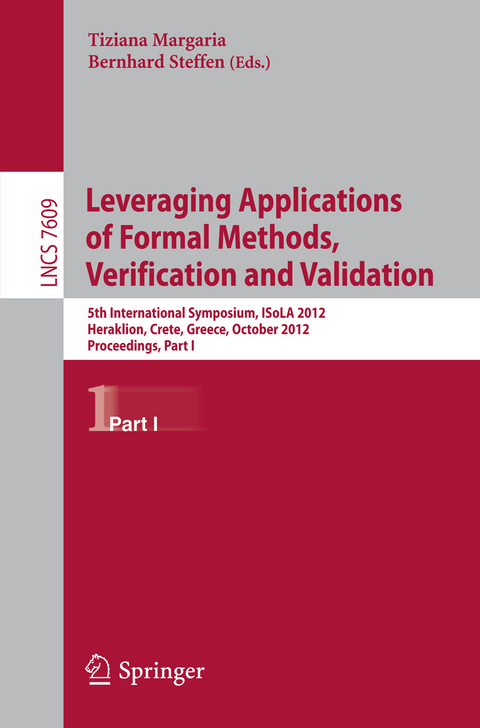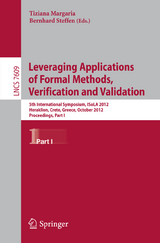Leveraging Applications of Formal Methods, Verification and Validation
Springer Berlin (Verlag)
978-3-642-34025-3 (ISBN)
The two volumes contain papers presented in the topical sections on adaptable and evolving software for eternal systems, approaches for mastering change, runtime verification: the application perspective, model-based testing and model inference, learning techniques for software verification and validation, LearnLib tutorial: from finite automata to register interface programs, RERS grey-box challenge 2012, Linux driver verification, bioscientific data processing and modeling, process and data integration in the networked healthcare, timing constraints: theory meets practice, formal methods for the development and certification of X-by-wire control systems, quantitative modelling and analysis, software aspects of robotic systems, process-oriented geoinformation systems and applications, handling heterogeneity in formal development of HW and SW Systems.
Bernhard Steffen studierte Mathematik an der Christian-Albrechts Universität zu Kiel, wo er anschließend auch in der Informatik promovierte. Nach Forschungsaufenthalten am Laboratory for Foundations in Computer Science in Edinburgh und an der Universität Aarhus, wurde er 1990 an die RWTH Aachen berufen, von wo er 1993 an die Universität Passau auf den Lehrstuhl für Programmiersysteme wechselte. Seit 1997 leitet er den Lehrstuhl für Programmiersysteme und Compilerbau an der TU-Dortmund. Bernhard Steffen ist Gründer der internationalen Konferenz über Tools and Algorithm for the Conbstruction and Analysis of Systems (TACAS) und des internationalen Journals über Software Tools for Technology Transfer (STTT).
Adaptable and Evolving Software for Eternal Systems (Track Summary).- Challenges in Defining a Programming Language for Provably Correct Dynamic Analyses.- Eternal Embedded Software: Towards Innovation Experiment Systems.- A Liskov Principle for Delta-Oriented Programming.- Scientific Workflows: Eternal Components, Changing Interfaces, Varying Compositions.- An Object Group-Based Component Model.- Automated Inference of Models for Black Box Systems Based on Interface Descriptions.- Model-Based Compatibility Checking of System Modifications.- A Generic Platform for Model-Based Regression Testing.- Approaches for Mastering Change.- A Formal Approach to Software Product Families.- A Compositional Framework to Derive Product Line Behavioural Descriptions.- Delta-Oriented Monitor Specification.- Conflict Detection in Delta-Oriented Programming.- Family-Based Analysis of Type Safety for Delta-Oriented Software ProductLines.- A Vision for Behavioural Model-Driven Validation of Software Product Lines.- Parameterized Preorder Relations for Model-Based Testing of Software Product Lines.- SmartTies - Management of Safety-Critical Developments.- Tracking Behavioral Constraints during Object-Oriented Software Evolution.- Towards the Verification of Adaptable Processes.- Runtime Verification: The Application Perspective.- What Does AI Have to Do with RV? (Extended Abstract).- A Case for "Piggyback" Runtime Monitoring.- A Unified Approach for Static and Runtime Verification: Framework and Applications.- Statistical Model Checking QoS Properties of Systems with SBIP.- Monitoring Temporal Information Flow.- Dynamic Information-Flow Analysis for Multi-threaded Applications.- Bounded-Interference Sequentialization for Testing Concurrent Programs.- Runtime Verification of Biological Systems.- Behavioral Specification Based Runtime Monitorsfor OSGi Services.- Modelling and Decentralised Runtime Control of Self-stabilising Power Micro Grids.- Model-Based Testing and Model Inference.- Algorithmic Improvements on Regular Inference of Software Models and Perspectives for Security Testing.- Test-Case Design by Feature Trees.- Model-Based Static Code Analysis for MATLAB Models.- An Incremental Learning Algorithm for Extended Mealy Automata.- Learning Techniques for Software Verification and Validation.- Learning Stochastic Timed Automata from Sample Executions.- Learning Minimal Deterministic Automata from Inexperienced Teachers.- Model Learning and Test Generation for Event-B Decomposition.- Inferring Semantic Interfaces of Data Structures.- Learning-Based Test Programming for Programmers.- LearnLib Tutorial: From Finite Automata to Register Interface Programs.- Automated Learning Setups in Automata Learning.- The RERS Grey-Box Challenge 2012: Analysis ofEvent-Condition-Action Systems.
Challenges in Defining a Programming Language for Provably Correct Dynamic Analyses.- Eternal Embedded Software: Towards Innovation Experiment Systems.- A Liskov Principle for Delta-Oriented Programming.- Scientific Workflows: Eternal Components, Changing Interfaces, Varying Compositions.- An Object Group-Based Component Model.- Automated Inference of Models for Black Box Systems Based on Interface Descriptions.- Model-Based Compatibility Checking of System Modifications.- A Generic Platform for Model-Based Regression Testing.- Approaches for Mastering Change.- A Formal Approach to Software Product Families.- A Compositional Framework to Derive Product Line Behavioural Descriptions.- Delta-Oriented Monitor Specification.- Conflict Detection in Delta-Oriented Programming.- Family-Based Analysis of Type Safety for Delta-Oriented Software Product Lines.- A Vision forBehavioural Model-Driven Validation of Software Product Lines.- Parameterized Preorder Relations for Model-Based Testing of Software Product Lines.- SmartTies - Management of Safety-Critical Developments.- Tracking Behavioral Constraints during Object-Oriented Software Evolution.- Towards the Verification of Adaptable Processes.- Runtime Verification: The Application Perspective.- What Does AI Have to Do with RV? (Extended Abstract).- A Case for "Piggyback" Runtime Monitoring.- A Unified Approach for Static and Runtime Verification: Framework and Applications.- Statistical Model Checking QoS Properties of Systems with SBIP.- Monitoring Temporal Information Flow.- Dynamic Information-Flow Analysis for Multi-threaded Applications.- Bounded-Interference Sequentialization for Testing Concurrent Programs.- Runtime Verification of Biological Systems.- Behavioral Specification Based Runtime Monitors for OSGi Services.- Modelling and Decentralised Runtime Control of Self-stabilising Power Micro Grids.- Model-Based Testing and Model Inference.- Algorithmic Improvements on Regular Inference of Software Models and Perspectives for Security Testing.- Test-Case Design by Feature Trees.- Model-Based Static Code Analysis for MATLAB Models.- An Incremental Learning Algorithm for Extended Mealy Automata.- Learning Techniques for Software Verification and Validation.- Learning Stochastic Timed Automata from Sample Executions.- Learning Minimal Deterministic Automata from Inexperienced Teachers.- Model Learning and Test Generation for Event-B Decomposition.- Inferring Semantic Interfaces of Data Structures.- Learning-Based Test Programming for Programmers.- LearnLib Tutorial: From Finite Automata to Register Interface Programs.- Automated Learning Setups in Automata Learning.- The RERS Grey-Box Challenge 2012: Analysis of Event-Condition-Action Systems.| Erscheint lt. Verlag | 11.9.2012 |
|---|---|
| Reihe/Serie | Lecture Notes in Computer Science | Theoretical Computer Science and General Issues |
| Zusatzinfo | XVI, 617 p. 170 illus. |
| Verlagsort | Berlin |
| Sprache | englisch |
| Maße | 155 x 235 mm |
| Gewicht | 947 g |
| Themenwelt | Mathematik / Informatik ► Informatik ► Betriebssysteme / Server |
| Mathematik / Informatik ► Informatik ► Programmiersprachen / -werkzeuge | |
| Informatik ► Software Entwicklung ► User Interfaces (HCI) | |
| Informatik ► Theorie / Studium ► Künstliche Intelligenz / Robotik | |
| Schlagworte | Automata • concurrent programs • Model Checking • scientific workflows • Software Product Lines |
| ISBN-10 | 3-642-34025-3 / 3642340253 |
| ISBN-13 | 978-3-642-34025-3 / 9783642340253 |
| Zustand | Neuware |
| Haben Sie eine Frage zum Produkt? |
aus dem Bereich




